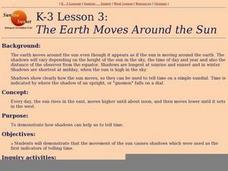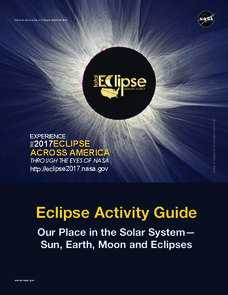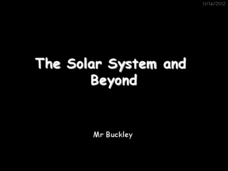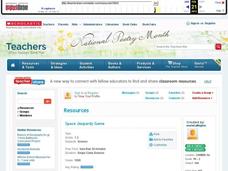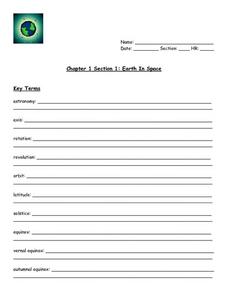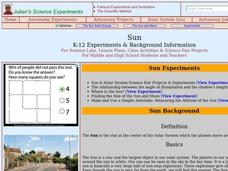Curated OER
What Shape is the Moon Tonight?
Learners understand that the moon appears differently throughout the month. In this phases of the moon lesson, students observe and record the phases of the moon.
Curated OER
Shoot for the Moon
Second graders distinguish the different phases of the moon. In this astronomy lesson, 2nd graders study the history of its discovery and myths about its origin. They simulate how the moon's surface is illuminated by the sun.
Curated OER
Moon
Students discover scientific facts about the Moon and how
some American Indian Tribes used the moon to measure time.
They accomplish this by listening to stories and poetry, writing
stories, communicating with an astronaut,...
Curated OER
The Solar System: Go Green with the Sun!
Third graders learn how to use solar power. In this sun, technology and energy instructional activity, 3rd graders learn how the solar power from the sun can give off energy, learn about solar panels, discuss their uses and benefits,...
Curated OER
Origins: Earth Is Born
Students develop a timeline of all the major events involved in the formation of the Earth and the emergence of humans. In groups, they focus on a specific topic by watching a PBS program and taking notes. After the video, they list...
Curated OER
Phases of the Moon
Students answer the question, "How are the motions of the Earth, the moon, and the sun, related to the moon's phases?" They observe the moon to create a moon journal and a phases of the moon diagram.
Curated OER
Phases of the Moon
Students read "The Moon Seems to Change" and conduct an experiment with oranges to demonstrate the phases of the moon. They write about the experiment and describe each phase of the moon.
Curated OER
The Earth Moves Around the Sun
Students demonstrate that the movement of the sun causes shadows which were used as the first indicators of telling time.
EngageNY
How Far Away Is the Moon?
Does the space shuttle have an odometer? Maybe, but all that is needed to determine the distance to the moon is a little geometry! The lesson asks scholars to sketch the relationship of the Earth and moon using shadows of an eclipse....
NASA
Eclipse Activity Guide
Ever made solar s'mores? Or recreated the solar system using peanuts? Astronomers young and old investigate all things solar using a variety of activities. Explore how the sun works, types of light it emits, and methods of charting the...
Astronomical Society of the Pacific
Getting Ready for the All American Eclipse!
Give your pupils a front row seat at the biggest light show in the sky this year! In addition to admiring the total solar eclipse, young astronomers can explain the phenomenon with a little help from an inquiry-based lesson. The focus of...
Curated OER
Wobbling in Circles
Sixth graders role play the parts of the sun, the moon and the Earth as they simulate the concepts of revolution and rotation. They act out the parts in small groups and discuss the concepts as a class.
Curated OER
The Solar System and Beyond
Survey the solar system by viewing this PowerPoint. Amateur astronomers discover that gravity is responsible for Earth's orbit around the sun and the moon's orbit around Earth. They explore the moon's phases and Earth's seasons. This...
Curated OER
Day and Night
Expand your third graders' universe with a science activity about Earth's rotation. They read a short explanation about the direction of sunlight, then draw an arrow to indicate which way the sun is pointed at an illustration of the...
Curated OER
Space Jeopardy Game
Young scholars explore space. For this space lesson, students analyze the sky and what causes its changes. Young scholars describe the moon patterns and use a model to show changes in its shape. Students also describe the first trip to...
Curated OER
Earth in Space
In this reason for the days and nights on earth worksheet, students study the reasons the Earth has days and nights by answering 28 questions about earth's rotation, the equator, the relationship between the sun and moon, and the earth's...
Curated OER
The Moon
Young scholars design and build an ideal lunar settlement. In this astronomy lesson, students identify the key features of the moon. They compare its environmental condition with the Earth's.
Curated OER
Sun
Learners study how the sun is at the center of the solar system. In this solar lesson students measure the altitude of the sun and its size.
Curated OER
Spring Tides
In this tides learning exercise, students read about spring tides. Then students use a source of tide information to determine the high and low tides for the day and the phase of the moon. Students draw an illustration of the alignment...
Curated OER
Who Wants to be a Millionaire: Solar System
Fourth and fifth graders will love showing what they know about the planets and our solar system. This game is fashioned after "Who Wants to be a Millionaire" and has the class work through fifteen different solar system related...
Journey Through the Universe
How Far is Far?
The earth only revolves around one thing — and it's not any of your pupils. The lesson includes two activities dealing with the distance to the sun and the moon. First, scholars create a pin hole camera and use the rules of similar...
Curated OER
Scale Activities
How do you put something as large as the universe in perspective? Use a series of scale experiments. Classmates collaborate around four experiments to examine the scale of the earth-moon system, our solar system, the Milky Way galaxy,...
EngageNY
The Motion of the Moon, Sun, and Stars—Motivating Mathematics
What does math have to do with the behavior of the earth and sun? Learn how the movement of celestial bodies has influenced the development of trigonometry. Scholars connects the details in mathematics to their real-world meaning.
Curated OER
Moon Phase Flip Books
What better way to study the moon phases than to see them in action? The directions on the handout only have kids cut out and tape on the moon phases to make the flipbook, but it would be even more powerful to include the name of each...
Other popular searches
- Earth Moon Sun System
- Sun Earth and Moon
- Sun Moon Earth
- Earth and Moon and Sun
- Earth, Moon and Sun
- Rubric Sun Moon Earth
- Sun, Earth and Moon
- Sun Earth Moon System








